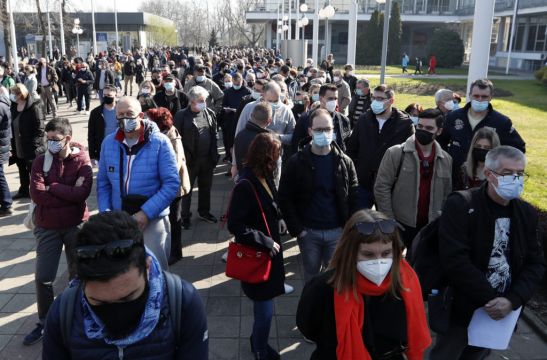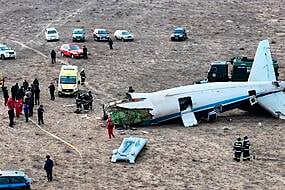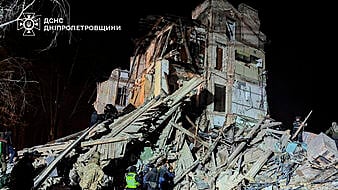Thousands of vaccine-seekers from countries neighbouring Serbia have flocked to Belgrade after Serbian authorities offered foreigners free coronavirus jabs if they showed up over the weekend.
Long lines of Bosnians, Montenegrins and North Macedonians – often entire families – formed in front of the main vaccination centre in the Serbian capital as police kept watch.
“We don’t have vaccines. I came here to get vaccinated,” said Zivko Trajkovski, who is from North Macedonia. “We are very grateful because we can vaccinate quicker than in Macedonia.”
Zoran Dedic, of Bosnia, noted that his country and Serbia were part of a joint federation before Yugoslavia disintegrated in a war during the 1990s. “It does not make any difference, Bosnia or Serbia. It does not matter,” he said.
Most of Serbia’s Balkan neighbours have been struggling with shortages and have barely started mass vaccination drives, while Serbia boasts of having ample supplies and one of Europe’s highest per capita vaccination rates.

The Serbian government has donated vaccine doses to North Macedonia, Montenegro and Bosnia.
Critics of populist Serbian President Aleksandar Vucic contend he is trying to spread his influence in the Balkans and to polish the ultranationalist image he acquired during Yugoslavia’s bloody break-up.
Others say that the AstraZeneca vaccine shots Serbia is giving foreigners are nearing their expiration date and need to be used as soon as possible, a claim that could not be verified.
Bosnia’s Klix news portal described huge lines of cars forming at border crossings with Serbia on Saturday morning.
Klix reported that Bosnian businessmen were scheduled to receive jabs on Saturday after Serbia’s Chamber of Commerce offered 10,000 shots to their colleagues in the region.
Serbia has one of the highest inoculation rates in Europe, mainly thanks to the government’s large purchases of the Sinopharm vaccine from China and the Russian Sputnik V vaccine. The country is also using the vaccines developed by Pfizer-BioNTech and Oxford-AstraZeneca.
Although more than two million people in the country of seven million have so far received at least one shot, Serbia has seen a notable decline in the number of residents signing up. Officials and doctors link the drop-off in interest to an increasingly vocal anti-vaccine movement.







